Hatta Honey Bee Garden: Discover Dubai's Beekeeping Gem
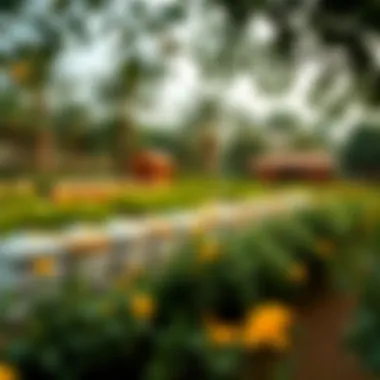
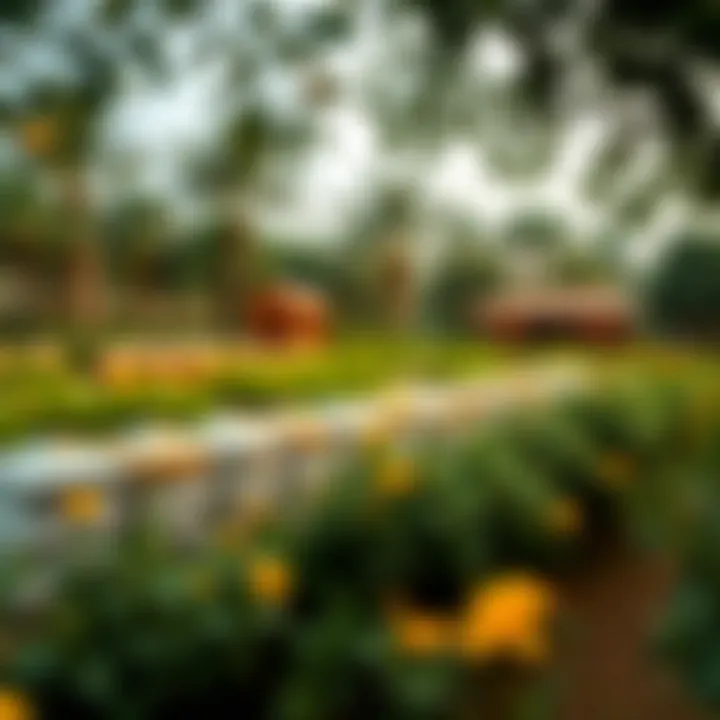
Intro
Nestled amidst the rugged mountains of Hatta, the Hatta Honey Bee Garden represents a vision that merges nature's art with human innovation. This initiative is more than just a garden; it serves as a vital hub for ecological preservation and sustainable agricultural practices, right in the heart of Dubai's Hatta region. With the buzz surrounding bee conservation gaining momentum, this garden steps up to the plate, showcasing how critical these pollinators are for both our environment and our food supply.
The significance of bee populations cannot be overstated. They play a fundamental role in pollinating crops, thus contributing significantly to food security. Visitors to the Hatta Honey Bee Garden are not merely spectators but are engaged learners, absorbing the nuances of beekeeping, the life cycle of bees, and their intricate relationship with the environment. Educational programs foster understanding and awareness, offering a deep dive into the importance of maintaining healthy bee colonies.
Honey production is another feather in the cap of the Hatta Honey Bee Garden. The region's unique flora, in tandem with expert beekeeping practices, leads to honey that's not just sweet but also reflects the terroir of Hatta. It's a sweet spot for enthusiasts who wish to understand the delicate balance between ecological practices and agricultural results.
In looking at the interconnectedness of bee species and local ecosystems, it becomes clear that the Hatta Honey Bee Garden stands as a beacon of Dubai's commitment to environmental sustainability. It is where urban development meets nature, spurring discussions on how cities can coexist harmoniously with global warming’s challenges. This article will unravel the layers of this unique initiative, discussing what makes it integral to the future sustainability landscape, and inviting readers to reflect on their impact within this harmony.
Prologue to Hatta Honey Bee Garden
The Hatta Honey Bee Garden stands out as an exemplary model where ecological significance and agricultural advancement coalesce in Dubai's scenic hinterlands. Its importance cannot be overstated, as it presents a profound opportunity to understand the role of bees not only in enhancing the local ecosystem but also in promoting sustainable practices that resonate with Dubai's broader environmental goals. Visitors and locals alike are drawn into a world where honeybees thrive, providing a tangible experience that highlights the relationship between nature and urban environments.
Overview of Hatta's Ecological Significance
Nestled in the Hatta region, the garden is a microcosm of biodiversity. Hatta itself is surrounded by rugged mountains and waterways, creating a unique habitat that supports various plant and animal life. The presence of this garden is crucial, as it contributes to the stabilization of local ecosystems through natural processes like pollination. When bees fly from flower to flower, they not only collect nectar but also facilitate the reproduction of plants, ensuring a healthy habitat.
Moreover, Hatta's ecological efforts serve a dual purpose: protecting the environment and supporting agriculture. By focusing on native plants, the garden helps to maintain balance in the ecosystem while promoting awareness around ecological conservation. Here, the conservation of bees directly contributes to sustaining local flora, which in turn supports local fauna. This cycle of life underscores the importance of beekeeping and ecological stewardship in the region.
The Birth of the Honey Bee Garden Initiative
The Hatta Honey Bee Garden did not come to be overnight; its inception speaks volumes about the commitment to sustainable development in Dubai. The initiative was born out of a realization that urban environments face numerous challenges, from habitat loss to pollution, which adversely affects bee populations and, consequently, the health of the ecosystem. Recognizing this plight, local authorities and environmental groups came together to promote a project that marries beekeeping with education and conservation efforts.
With the establishment of the garden, a platform for education and awareness was created, highlighting the critical role bees play within our ecosystem. Instead of simply focusing on honey production, the initiative emphasizes a holistic approach to understanding ecology, sustainability, and agriculture. Workshops, educational tours, and community events offer insights into beekeeping practices, encouraging active participation from residents and visitors alike.
This initiative serves not just as a haven for bees but as an educational hub where people can learn, interact, and advocate for environmental stewardship. The birth of the Honey Bee Garden reflects a conscious effort to foster a sustainable future while celebrating the intrinsic value of nature in an urbanized world.
Exploring the Unique Features of the Garden
When visiting the Hatta Honey Bee Garden, it's not just about honey and bees; it's about the unique attributes that make this garden a standout, both ecologically and touristically. Understanding these features is crucial for anyone looking to appreciate Dubai's blend of urban life with nature. In an era where ecological conservation and sustainability are becoming paramount, this garden serves as a model for innovative beekeeping while also providing educational opportunities for a diverse audience.
Diverse Bee Species and Their Roles
One of the standout features of the Hatta Honey Bee Garden is its rich biodiversity. Within its confines, you can find a variety of bee species, each playing a different role in maintaining ecological balance. For instance, the garden boasts both domestic honey bees like Apis mellifera and native species such as the Osmia spp.. Each bee contributes uniquely to pollination and honey production.
- Apis mellifera: Known for their robust honey yield and adaptability, they are the backbone of commercial honey production. These bees can produce a significant amount of honey, essential for both economic viability and local nutrition.
- Osmia spp.: These bees, often less known, are excellent pollinators, especially for fruits and vegetables. They also do a diligent job of pollinating plants during early spring when other bees are still hibernating.
This diversity not only helps in sustaining the local flora but also promotes genetic resilience, crucial in adapting to environmental changes. By educating visitors about these diverse species, Hatta Honey Bee Garden enlightens everyone on the importance of each bee's role and encourages engagement in conservation efforts.
Beekeeping Practices and Techniques
The methods employed in Hatta Honey Bee Garden are thoughtful and aimed at fostering bee well-being. Combining traditional practices with modern technology, beekeepers here focus on sustainable techniques that do not harm the bees or their environment. For example, the garden employs the use of organic treatments for pest management rather than harmful chemicals, ensuring the health of the colony.
- Top-bar hives: Using these hives, which are designed to mimic the natural environment of bees, allows for easier honey harvesting while reducing stress on the bees. This method supports a healthier bee colony.
- Queen rearing: In the garden, techniques to rear queens are practiced, promoting stronger colonies and increased honey production without the need to purchase new queens from external sources.
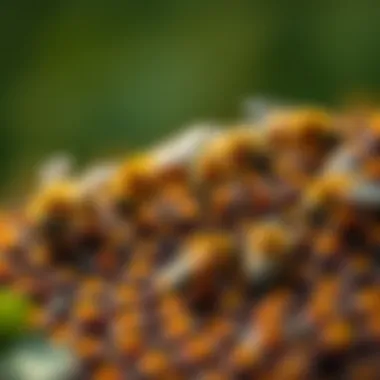
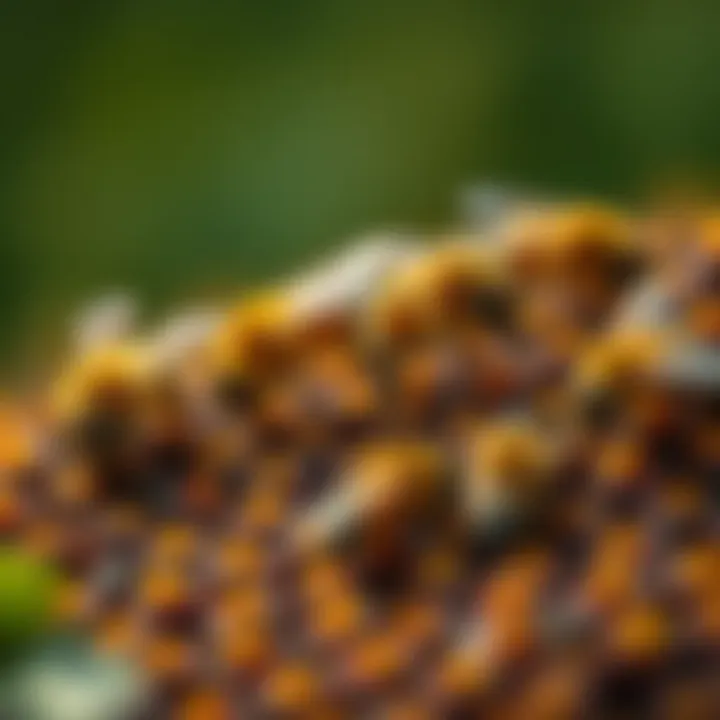
Visitors to the garden often have the opportunity to observe these practices firsthand and understand how beekeeping can be both profitable and ecologically sound. This offers both an educational framework and practical insight into what goes into sustainable beekeeping.
Honey Production Methods
Honey production in Hatta is not only an art but also a science. The garden follows rigorous methods that highlight quality over quantity. Harvesting honey sustainably means ensuring that enough remains for the bees to thrive. For example, only a portion of the honey is extracted from each hive, ensuring that the colony has enough to sustain itself through the year. This mindful approach guarantees a continuous cycle of honey production.
- Cold extraction: Honey is extracted using minimal heat to preserve the quality and natural enzymes crucial for health benefits. After extraction, it is bottled and labeled organically, appealing to health-conscious consumers.
- Floral diversity: The garden cultivates numerous plants that blossom at different times of the year, including wildflowers and flowering shrubs. This diversity affects the flavor profile of the honey, offering unique tastes that consumers value.
In essence, the honey produced in Hatta is a reflection of the environment, local flora, and careful cultivation practices. This practice not only satisfies market demands but also promotes ecological sustainability.
Bees and Their Contribution to the Ecosystem
Bees play a critical role in supporting all life on Earth. Their contribution to the ecosystem is nothing short of monumental, impacting not only the immediate surroundings where they thrive but also influencing global food systems and environmental health. Without these industrious insects, the balance of nature as we know it would tip, leading to dire consequences.
Pollination: The Key to Plant Diversity
Pollination is arguably the most significant contribution bees make to the environment. This process, where bees transfer pollen from one flower to another, is a key mechanism for plant reproduction. It's estimated that bees are responsible for pollinating approximately 75% of the flowering plants that produce a staggering variety of fruits, vegetables, and nuts.
Consider the full scope of this task. When bees visit a flower, they inadvertently collect pollen on their hairy bodies, which gets transferred to other blossoms. This not only helps in breeding new plants but also increases genetic diversity within species. A plant population with higher genetic variation is more resilient, ensuring food security in the face of environmental challenges.
"Without bees, we would lose a significant portion of our crops, leading to not just economic repercussions but also a diminished diet."
In the Hatta Honey Bee Garden, local flora benefits immensely from this natural service performed by bees. Improved pollination throughout the region leads not just to healthier plants but also encourages a thriving ecosystem, attracting various fauna that depend on native flora for their survival.
Sustaining Biodiversity in Hatta
Biodiversity is the lifeblood of any ecosystem, and bees are its steadfast guardians. In the hilly terrains of Hatta, where the undulating landscape provides a mosaic of habitats, bees contribute to sustaining this diversity. The interplay between plant and animal species forms a delicate web, holding together the ecological integrity of the area.
By fostering pollination, bees directly support the growth of various native plant species. This, in turn, sustains avian and insect life that relies on these plants for shelter and food.
Benefits of Biodiversity Supported by Bees:
- Enhanced Resilience: More diverse ecosystems are better equipped to recover from disturbances, whether due to climate change or human activities.
- Cultural Significance: Many local communities in Hatta rely on traditional crops for their culinary practices, which are maintained through effective pollination.
- Tourism Appeal: Diverse plant life attracts visitors, potentially enhancing eco-tourism opportunities that benefit the local economy.
Through their natural behaviors, bees serve as a barometer for the health of the Hatta ecosystem. When bee populations thrive, it is a good indicator that the environment is stable and capable of supporting various life forms.
By preserving bees and their habitats, we don't just protect these industrious insects; we safeguard a wide breadth of ecological wonders.
For more detailed insights into why bees are vital for biodiversity, consider resources from National Geographic or research articles from major universities like Harvard University.
Educational Aspects of the Hatta Honey Bee Garden
The Hatta Honey Bee Garden plays a pivotal role in promoting education around beekeeping and environmental conservation. By offering a variety of educational programs, the garden underscores the significance of bees in our ecosystems and illustrates best practices in sustainable farming. This educational focus resonates not just with nature enthusiasts, but also with investors and entrepreneurs who recognize the growing importance of eco-friendly practices in today’s market. Through hands-on experiences and learning opportunities, visitors and participants can appreciate the intricate relationship between bees, agriculture, and environmental stewardship.
Workshops and Interactive Learning Opportunities
One of the standout features of the Hatta Honey Bee Garden is its workshops that cater to diverse audiences. Participants can engage in interactive learning sessions that cover everything from basic beekeeping techniques to advanced honey extraction methods. These workshops are strategically designed to be accessible, breaking down complex concepts into digestible segments, making them suitable for both novices and more seasoned aficionados.
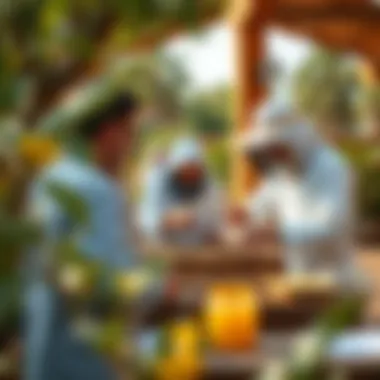

The garden often collaborates with local beekeepers and agricultural experts, ensuring that the content delivered is grounded in real-world experience. For instance, a typical workshop may include:
- Hands-on experience in hive management: Participants get to don protective gear and work directly with the hives. This firsthand experience is invaluable in understanding bee behavior, hive maintenance, and honey production.
- Educational talks on bee biology and ecology: Experts explain how bees interact with the environment, emphasizing their role in pollination and promoting biodiversity.
- Crafting homemade bee products: Attendees might also learn to make beeswax candles or lip balms, thus creatting a tangible connection to the benefits of bee products.
These workshops not only foster a deeper understanding of bees but also inspire a sense of community among participants, many of whom share a passion for sustainability and agroecology.
Promoting Environmental Awareness
The Hatta Honey Bee Garden excels in its mission to promote environmental awareness. It addresses pressing concerns about bee populations, especially in urban settings. By educating visitors on the importance of bees, the garden highlights potential consequences of declining bee health, such as reduced agricultural yields and a loss of plant diversity.
One impactful approach has been public outreach campaigns, where the garden teams up with schools to offer field trips tailored to children. During these trips, kids learn not just about bees but about overall environmental stewardship. This educational outreach can cover topics like:
- The importance of a balanced ecosystem: Understanding how bees contribute to pollination and the cascading effects that come from their decline.
- Sustainable practices to protect bee health: Sharing information on pesticide alternatives and how to create bee-friendly gardens in urban environments.
- The climate crisis and its effects on pollinators: Engaging discussions on how climate change impacts bee behavior and habitats, thus fostering critical thinking on environmental challenges.
"Educating the upcoming generation about bees and their essential role in nature might just be one of the most significant ways to ensure a sustainable future."
In summary, the educational aspects of the Hatta Honey Bee Garden not only serve to enlighten individuals about beekeeping but also inspire a broader commitment to environmental health and sustainability. By connecting hands-on experiences with essential knowledge, the garden stands as a model for similar initiatives, cultivating appreciation and respect for our vital pollinators.
The Economic Impact of Sustainable Beekeeping
Sustainable beekeeping is more than just a trend; it acts as the linchpin connecting environmental stewardship and economic viability. In a bustling city like Dubai, where urban sprawl seems to devour every natural resource it touches, initiatives like the Hatta Honey Bee Garden present a refreshing take on how we can cultivate nature while also reaping economic benefits. Not only does beekeeping provide a natural mechanism for pollination, but it also fosters a whole ecosystem that supports local economies. This section delves into how sustainable beekeeping, influenced by initiatives in Hatta, is forging new paths for economic health in the region.
Honey Trade and Local Economy
When examining the economic impact of beekeeping, one cannot ignore the lucrative honey trade. The demand for natural, organic honey is on the rise globally, tapping into the health-conscious consumer market. In Hatta, honey is not merely an agricultural product; it's a symbol of purity and sustainability, appealing to both local buyers and tourists alike.
- Job Creation: The honey trade is creating jobs not just in beekeeping, but in associated industries. This includes roles in marketing, tourism, and even restoration of natural environments that support bee habitats.
- Local Craftsmanship: Many local artisans create unique honey-based products beyond just the liquid gold. For example, beeswax candles and artisanal soaps find their way into local markets, infusing added value around honey production.
- Revenue Generation: Hatta's honey is reaching local stores and international markets, contributing significantly to the region's GDP. The honey trade can outperform other agricultural products, making it a powerful economic driver.
Furthermore, the sustainability aspect grows appeal; consumers are becoming more conscious of where their food comes from. This organic connection between local beekeepers and consumers adds to the charm of the honey trade, boosting both profit margins and community identity.
Eco-Tourism Potential in Hatta
Hatta has a unique charm and a backdrop that sets the stage for eco-tourism. It’s a cradle for nature enthusiasts, and the Hatta Honey Bee Garden plays a vital role in this narrative. The seamless blend of ecological preservation and tourism can serve as a model for other cities.
- Visitor Attraction: The garden serves as a draw for tourists who are looking to experience not just nature, but the intricate relationships within it. Offering guided tours and tastings can also boost visitor interactions, making the honey and its producers more relatable.
- Educational Value: Eco-tourism brings with it opportunities for educational workshops. Visitors can learn about beekeeping techniques, the significance of bees in the ecosystem, and even partake in honey extraction processes. Knowledge sharing fosters a more committed consumer base.
- Cultural Exchange: As travelers explore Hatta and engage with local beekeepers, they contribute to a cultural exchange that benefits the local community. This mixing of ideas and practices not only reinforces the local economy but also expands the market for Hatta's honey on an international scale.
In summary, sustainable beekeeping is an invaluable component of Hatta's economy. With its strong focus on local honey production and eco-tourism, it has positioned itself as a model of how intertwining economic interests with ecological awareness can lead to mutual benefit. As this initiative expands, it has the potential not just to enhance local livelihoods, but also to educate a wider audience about the importance of bees to our world.
Challenges Facing Beekeeping in Urban Environments
Urban beekeeping is a relatively recent development, one that brings many benefits alongside notable challenges. In a bustling city like Dubai, the juxtaposition of skyscrapers and green spaces creates a unique set of obstacles for local beekeepers. These issues do not just affect honey production; they have ripple effects on biodiversity and ecological health. Understanding these challenges is crucial for anyone interested in the sustainability of such initiatives like the Hatta Honey Bee Garden.
Pollution and Its Effects on Bee Health
Bees are sensitive creatures, and urban pollution can wreak havoc on their health. Airborne pollutants like particulate matter can adversely affect bees’ immune systems, making them more susceptible to diseases.
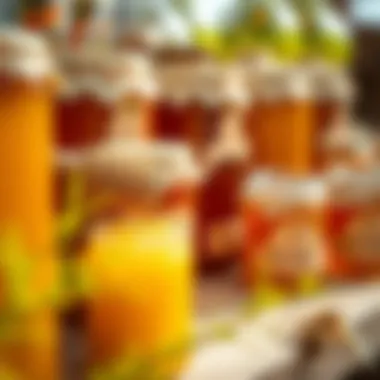

Furthermore, chemical pollutants from vehicles and industrial activities can harm bee populations. Studies indicate that bees exposed to these toxic substances may suffer from impaired memory and navigation skills. These impairments make it exceedingly difficult for bees to find their way back to their hives after foraging. The impact of pesticides used in urban gardening further complicates their situation, as these chemicals can accumulate in the nectar and pollen that bees consume.
Here are several pollutants that pose significant risks to bee health:
- Heavy metals: Accumulated from vehicles and industrial waste, these can interfere with bees’ biological functions.
- Pesticides and fungicides: Commonly used in urban gardening, they can lead to hive collapse.
- Airborne particulates: Dust and soot can affect honey quality and bee hygiene.
When an urban environment is not managed well, beekeeping can become not just a challenge but a risky endeavor.
Urban Development and Habitat Loss
The rapid urbanization seen in cities like Dubai has led to significant habitat loss, which is detrimental to bee populations. The traditional floral resources that bees rely on for food are quickly disappearing, replaced by concrete and asphalt.
This phenomenon often results in a lack of foraging opportunities for bees. Less greenery means fewer flowers, leading to poor nutrition for the bees. Furthermore, as construction projects wipe out local flora, the act of foraging becomes a formidable challenge.
In addition to habitat loss, urban development can also cause disturbances to nesting sites. Bees often thrive in small cavities and wild environments, but high-rise buildings and urban sprawl encroach on these natural habitats. The increasing noise levels associated with urban life disrupt bee communication, which relies on specific sound vibrations.
Future Prospects for Hatta Honey Bee Garden
The future prospects for the Hatta Honey Bee Garden paint a picture of growth and innovation in the field of sustainable apiculture. As environmental concerns continue to rise globally, initiatives like this garden serve as essential beacons of hope. The importance of this topic within the article cannot be overstated; it not only highlights what is currently happening in the realm of beekeeping but also sets the groundwork for ongoing and expanded efforts aimed at ecological preservation and community involvement. In a fast-developing region like Dubai, the blend of nature and city life calls for thoughtful strategies that balance progress with environmental stewardship.
Expansion Plans and New Initiatives
Looking ahead, the Hatta Honey Bee Garden is poised for significant expansion. Plans are underway to increase the number of bee colonies, which would also include the introduction of native bee species. This initiative is not just about quantity, though; it aims to enhance the genetic diversity of bee populations in the area. Among the new projects in the pipeline, there is talk of incorporating more interactive learning experiences for visitors, including extended workshops and guided tours that delve deeper into the art of beekeeping.
- Community Involvement: The expansion also includes efforts to engage local schools and community organizations in bee conservation, hoping to foster a sense of ownership and awareness among younger generations.
- Research Partnerships: Collaborations with universities are also being considered to study the impacts of urbanization on bee health and practices. These partnerships would be crucial for generating data that informs future practices not just at the garden, but within urban centers across the UAE.
All these initiatives together hold the promise of creating a more engaged and informed public, vital for the long-term success of the Hatta Honey Bee Garden.
Integration with Dubai's Sustainable Development Goals
Integrating the practices of the Hatta Honey Bee Garden with Dubai’s broader sustainable development goals is essential for long-term impact. This garden plays a pivotal role in aligning with several key targets, particularly those focused on sustainability, environmental education, and community well-being.
- Promoting Biodiversity: By supporting local flora through pollination, the garden directly contributes to the flourishing of Dubai’s biodiversity, aligning with SDG 15, which focuses on life on land.
- Encouraging Responsible Consumption: The production and sale of honey from the garden promotes local agriculture and eco-friendly practices, championing SDG 12 about ensuring sustainable consumption and production patterns.
- Sustainable Cities: Finally, as cities grapple with the challenges of rapid development, the Hatta Honey Bee Garden exemplifies how green spaces can coexist within urban environments, reflecting SDG 11 focused on making cities inclusive, safe, resilient, and sustainable.
The intertwining goals solidify the garden's significance not just for Hatta but for the entirety of Dubai, as it aspires towards a sustainable future. The collaboration between local government bodies and the garden can set precedents for how urban areas approach green initiatives going forward.
"Sustainability is not just an ideal; it's a way of living that can bridge the gap between nature and urban life."
The Hatta Honey Bee Garden’s expansion and its educational approach will usher in a new wave of awareness and commitment to the environment, signaling a brighter future for both bees and the surrounding communities.
Ending
As we draw the curtains on our exploration of the Hatta Honey Bee Garden, it becomes abundantly clear that this initiative is not just about bees; it’s about a nuanced understanding of how these industrious creatures play an undeniable role in our ecosystem. The importance of bees extends far beyond the production of honey; they are essential accelerators of biodiversity. Pollination, which bees facilitate, is the lifeblood of our plants. It ensures that flora can reproduce, providing the foundation for a healthy environment. In fact, without bees, many of the fruits and vegetables we enjoy today would be in peril.
"The future of our planet relies on the smallest workers – bees."
In Hatta, these small but mighty pollinators contribute significantly to the local ecosystem, driving the growth of native plants and supporting a diverse array of wildlife. This interdependence illustrates the delicate balance of nature, where every species, big or small, has its part to play. For investors, homeowners, and entrepreneurs, recognizing the economic value of this ecological service is vital. The garden serves not just as a sanctuary for bees but as a reminder of the need for environmental stewardship that bridges agricultural practices with sustainable living.
The role of Hatta Honey Bee Garden goes beyond its ecological contributions. It serves as a template for urban environments globally, showcasing how city landscapes can be augmented with nature-friendly initiatives. It embodies the notion that urban development doesn't have to come at the cost of environmental degradation. Instead, it can thrive alongside it, enriching both the community and its surrounding ecosystems.
In synthesizing these insights, the key takeaway is that initiatives like the Hatta Honey Bee Garden are significant for their multidimensional impacts – ecological, economic, and educational. They offer a holistic approach to maintaining a thriving narrative in the face of urban development. It is an urgent call for all stakeholders to get involved and support sustainable practices that safeguard the future of our planet.
By understanding these dynamics, we are better equipped to make informed decisions that honor the interconnectedness of our world, emphasizing the need for collective action in favor of sustainable practices. The Hatta Honey Bee Garden stands as a beacon of what is possible when we harmoniously bind nature and urbanization.



